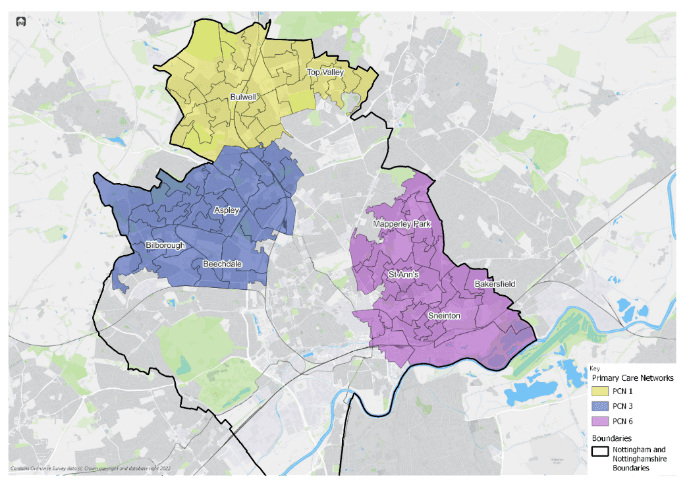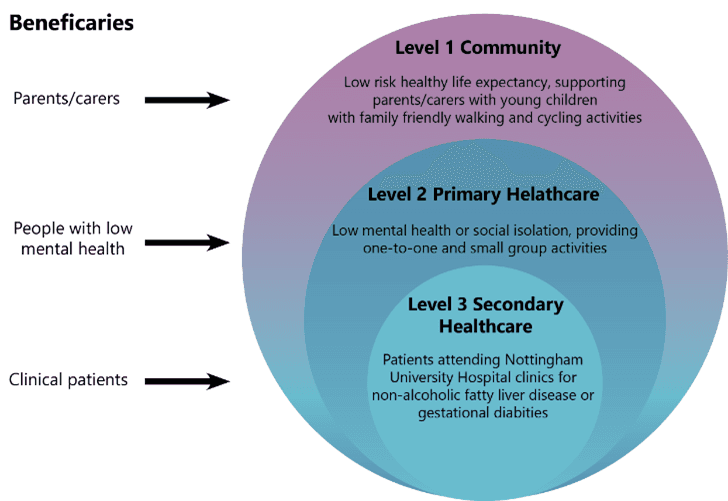
blog: Applying social prescribing thinking to active travel behaviour change
Wednesday 5th July 2023
Over the years, transport planning professionals have delivered behaviour change programmes that reach out to ‘the many’. These campaigns aim to provide large numbers of people with travel information and advice to nudge them to make changes to their daily travel patterns. Whilst that approach is right for some audiences, a different wave of behaviour change programmes are emerging, which focus more on intensively supporting ‘the few’. These targeted programmes provide people with not just information and advice, but a phased programme of activities to support them to walk and cycle more. This emerging partnership between the transport and healthcare sectors, identifies those who could benefit from moving more for their physical and mental health by walking and cycling. This approach to delivering behaviour change programmes is being termed ‘active travel social prescribing’.
What is social prescribing?
Social prescribing is a way that GPs or other healthcare professionals can refer (or prescribe) people to a Link Worker to access a range of free, ‘non-clinical’ services delivered by community partners. Those referred are often seeking practical, social and emotional support (rather than medical treatment), to take greater control of their health and wellbeing.
Typical social prescribing activities include wellness walks, or growing vegetables in a community garden. Incorporating active travel simply means that community-based walking and cycling activities will become available as part of social prescribing.
Why is this important?
Chronic illnesses take up 70% of health budgets yet there aren’t specific cures for them so looking beyond clinical treatment for managing those conditions is key. The concept of social prescribing approaches healthcare with the acknowledgment that people’s health is influenced by a range of factors and therefore holistically addressing these issues is the best way of tackling health disparities. Social prescribing also encourages personalised care, which involves asking people what matters to them, allowing individuals to have choice and control over the way care is delivered.
Although social prescribing has been embedded within the health and social care sector for many years it is only recently that the Department for Transport and Active Travel England have considered how they could provide funding to encourage more walking and cycling by integrating it into the social prescribing offer. This has a dual benefit, to supports those with healthcare needs to improve their physical and mental health, but also encourages more cycling and walking trips.
By virtue of being referred for social prescribing, those accessing the walking and cycling activities are likely to need more support than traditional behaviour change programmes to start walking and cycling. This means more 1-2-1 and tailored support to take that first step to go on a walk or a bike ride and then progressing to group walks / rides or self-led activities.
Over the last two years, ITP has worked with Nottingham City Council (NCC) and Nottingham City Place Based Partnership to secure funding from Active Travel England to deliver an Active Travel Social Prescribing (ATSP) pilot in the city from 2023-2025. The pilot aims to make walking and cycling accessible, by offering locally delivered activities in Bullwell & Top Valley; Beechdale, Bilborough & Aspley; and St Ann's and Sneinton.
These areas were identified in the feasibility stage as having the greatest healthcare need for social prescribing. Citywide healthcare data showed that 60% of referrals in these communities were for mental health, social isolation and this increased to 80% when including physical health reasons, making the case providing support in these areas.

The programme is predominantly designed to support groups at risk of low healthy life expectancy, those with poor mental health and those on clinical treatment pathways to become more active offering community-based provision through to more tailored and intensive support. However, it is open to a wider audience, where there is an identified need.
Walking and cycling activities will start to be rolled out over 2023 and will include led walks and rides, bike loans, cycle repairs and maintenance, walking buddy schemes and groups, cycle buddy schemes, adult cycle training and women’s cycle support packages.

How did ITP help?
Last year we worked alongside NCC and Nottingham City Place Based Partnership to speak to strategic and local stakeholders to inform Nottingham’s bid for ATSP funding. Nottingham was selected as one of 11 towns and cities to secure full funding for three years to deliver the pilot. This year, we have continued to support NCC with project mobilisation.
As with all social prescribing initiatives, there needs to be a clear way that people access the support available, this is called a referral pathway. One of our main tasks was to explore on a practical level how the proposed referral pathways would work, whilst also identifying any barriers to participation.
To do this we hosted several online and in-person workshops across the city to speak with 50 strategic and local stakeholders to help shape the programme. It included healthcare professionals, community and charity organisations, walking and cycling providers and council staff who will all be involved in the pilot programme and have experience of working with the identified beneficiaries.
What did we find out?
From our stakeholder engagement we learnt that building on existing networks within communities will be crucial to the programme’s success. Our discussions also emphasised the complexities for beneficiaries to be referred into social prescribing and showed that a linear referral pathway would not work. However, our discussions also highlighted the need for referrals to be seamless for the individuals entering the programme as the groups who will benefit the most will be those who find it hardest to navigate overly complex referrals. We therefore concluded that the programme needs to empower people to be able to improve their health and wellbeing by providing adequate support to overcome barriers to participation.
The outcome of ITP’s support was the definition of a clear referral pathway for each work strand to support NCC and the wider partners to be able to proactively move forward with delivering the programme this summer.
If you would like to know more about how ITP can help support active travel social prescribing, please get in touch: Stephanie.Meyers@itpworld.net.
